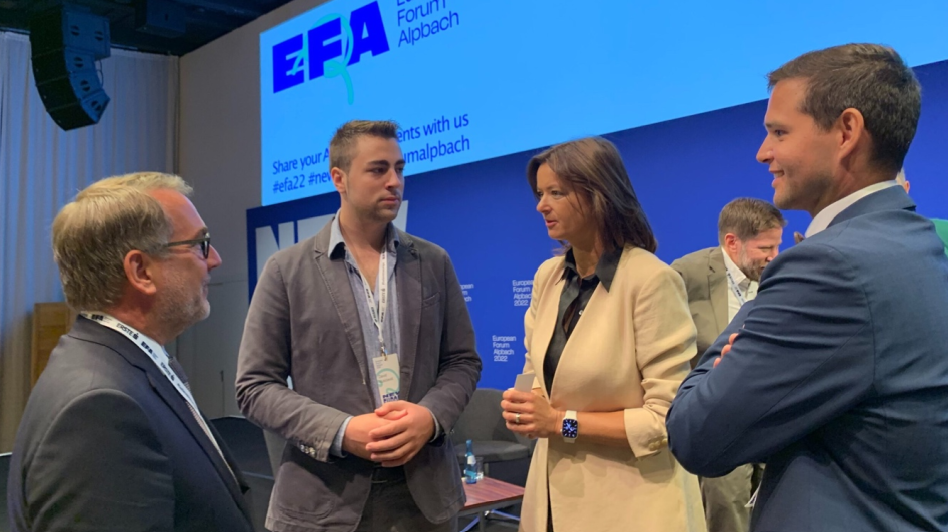On Wednesday, at the invitation of her Austrian counterpart Alexander Schallenberg, Minister of Foreign Affairs Tanja Fajon attended the Alpbach European Forum in Austria. During a panel discussion on the European Union’s geopolitical awakening, she said she was not in favour of restricting visas for Russian citizens as part of the EU sanctions against Russia over its aggression against Ukraine, reports the Slovenian Press Agency. Slovenia has been issuing visas on a very limited scale since the very start of the aggression; namely, we have been issuing about 10 to 15 percent of what was being issued before the aggression, the Ministry of Foreign Affairs explained a while ago. Judging by Fajon’s reluctance, could Russophilia be returning to the main stage in Slovenia?
“I am not in favour of limiting tourist visas. Any visa restrictions would also prevent people who oppose Putin’s policies and want to leave Russia from leaving the country. I believe that abolishing visas would be a risky move that could come back at us like a boomerang,” said Minister of Foreign Affairs Tanja Fajon, in a debate that touched on the proposal to abolish the issuing of tourist visas for Russian citizens as part of the EU sanctions against Russia. In the middle of August, the Ministry of Foreign Affairs told the Slovenian Press Agency that Slovenia would, just as it has done before, continue to “seek solutions together with the other EU member states” and that all EU foreign ministers would be discussing the possible introduction of a ban at an informal meeting at the end of the month.
The panel discussion was also attended by Austrian Foreign Minister Alexander Schallenberg, Prime Minister of Albania Edi Rama, Slovakian Minister of Foreign and European Affairs Ivan Korčok, Director of the Austrian Institute for European and Security Policy Velina Tchakarova, and the Deputy Chair of the Open Society Foundations, Alexander G. Soros, who is the son of George Soros. According to the Austrian Press Agency APA, Jan Lipavsky, Minister of Foreign Affairs of the Czech Republic, which currently holds the Presidency of the Council of the European Union, called for a limit on tourist visas for Russian citizens in a debate at the same panel on Wednesday. Lipavsky believes that very few Russians actually travel and that those who do are often rich people from Moscow and St Petersburg who have not felt the consequences of Russian aggression in Ukraine. He stressed that a much tougher policy was needed in this respect. The suggestion that Western countries should ban the entry of Russian citizens in order to put further pressure on the regime of Russian President Vladimir Putin, was first put forward by Ukrainian President Volodymyr Zelensky. Soon, the Prime Ministers of Russia’s other neighbours, Sanna Marin of Finland – whose party is in the same European family as Fajon’s – and Kaja Kallas of Estonia, joined the call. Estonia has since stopped issuing visas to Russian citizens and also banned Russians with tourist, business, sports and cultural visas issued in Estonia from entering the country.
When presenting his suggestion, Zelensky explained that this would be one way to reduce Russian support for the war in Ukraine, which is still quite high among the general population. It is the only sanction that would really hurt the Russian President. The regime can compensate for many things, but it cannot replace European capitals and beaches. But Fajon clearly does not share that opinion – and it is not the first time she has turned against Ukraine, even if she presents herself “differently” in public. Namely, Fajon, in one of her last votes in the European Parliament as an MEP, voted in favour of a resolution aimed at delaying the granting of candidate status to Ukraine. The resolution was adopted at a time when then-Prime Minister of Slovenia Janez Janša and Prime Minister of Poland Mateusz Morawiecki had written a letter to the President of the European Council, Charles Michel, taking the position that Ukraine should become a member of the European Union by 2030. In mid-June, Fajon then “corrected” her position, writing: “I am glad that Ukraine’s dream of an EU future is coming true. Congratulations also to Moldova and Georgia for receiving confirmation from the European Commission that they are on the right track. I also fully support the earliest possible progress of the Western Balkan countries on their EU path.” At the time, it looked like she had finally decided to cross over to the right side, but apparently, it was not for long.
Apart from the fact that she is not in favour of limiting tourist visas, Fajon did not say much else of substance during the panel discussion – she once again condemned the Russian aggression and called for an early end to the war. “We need wisdom and a long-term geopolitical strategy. The current crisis has shown us and the world that the European Union is strong when it is united. This should be the guiding principle for the continuation of our geopolitical awakening,” she stressed in her typical style of using many words.
Wednesday, the 24th of August, marked the 31st Independence Day in Ukraine. In light of the Russian invasion, the Ukrainian President stressed in his address that they would fight to the end, and congratulations and expressions of support for Ukraine poured in from many other countries. Prime Minister of Slovenia, Robert Golob, also congratulated Ukraine and stressed that Slovenia stands by Ukraine in this unprovoked war and is a committed partner on the road to recovery. The Ministry of Foreign Affairs also expressed support for Ukraine – but Tanja Fajon’s position suggests that this could also change soon.
Sara Kovač


